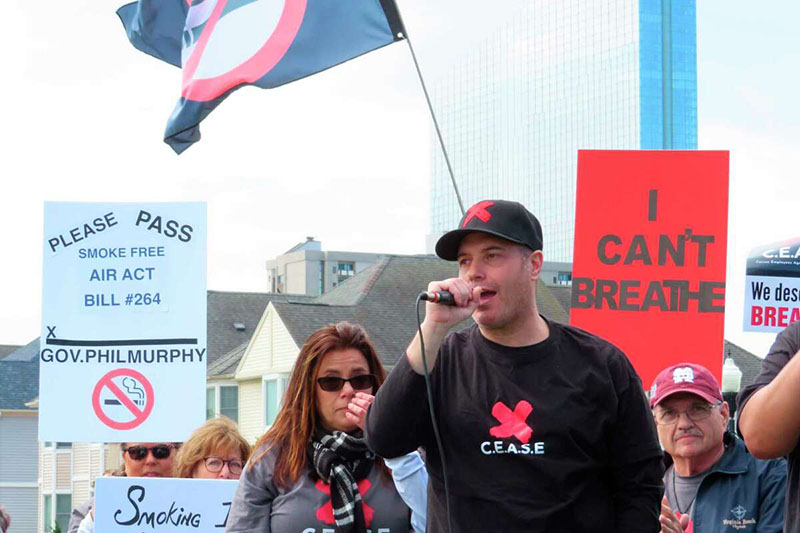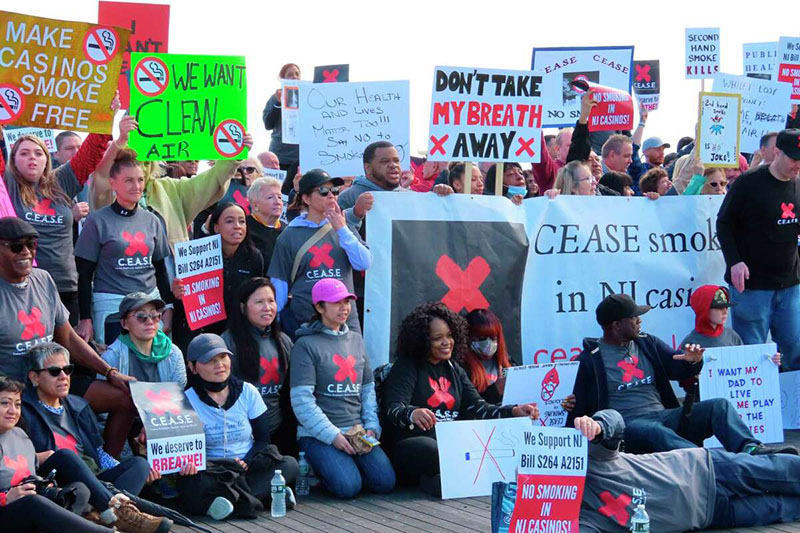ATLANTIC CITY — Could outdoor gambling be at least a partial solution to an impasse between Atlantic City casino workers who want smoking banned indoors, and gambling executives who fear a smoking ban would hurt business and cost jobs?
It may depend on what the definition of “outdoors” is.
For more than two years, many casino workers have been pushing for the enactment of a state law that would ban smoking inside Atlantic City’s nine casinos — virtually the only workplaces in New Jersey where indoor smoking is still allowed.
Is Outdoor Gambling The Key?
A bill that would end smoking in the casinos has sat untouched in the state Legislature for months and has yet to have a hearing — even though more than half the entire state Legislature has signed onto it as sponsors or co-sponsors. An identical bill introduced last year suffered the same fate, languishing without action.
The Casino Association of New Jersey, the industry’s trade association, opposes a smoking ban, saying it would lead to lower earnings and fewer jobs.
But a group of casino workers is adamant that any solution includes two non-negotiable demands: That no smoking be allowed inside the casinos, and that no casino worker is exposed to second-hand smoke.
Atlantic City currently allows smoking on 25% of the casino floor, but the areas are not contiguous.
Outdoor Gambling
“It’s spread throughout the floor, which essentially makes the entire casino floor a smoking area,” said Corinne Orlando of the American Heart Association.
A partial solution is instead being discussed among workers, casino officials and state Legislators: Creating some outdoor gambling spaces where smoking would be permitted. However, there is no wide agreement on just what constitutes an “outdoor area.”

“The devil is in the details,” said Pete Naccarelli, a dealer at the Borgata and a leader of the movement to ban smoking in Atlantic City casinos. “As long as no worker is exposed to secondhand smoke, a truly outdoor area could be a workable solution.”
Las Vegas, with its desert climate, has long offered outdoor gambling, including near — and sometimes even in — swimming pools. Gamblers can play cards at swim-up gambling tables.

In Maryland, “outdoor” gambling areas at casinos in Baltimore and Hanover appear to be largely enclosed spaces with a roof and walls, and some openings to let air in.
In Ohio, Hard Rock’s Cincinnati casino also has what it calls a “smoking patio,” separate from the main casino floor, that has ventilation systems and some direct air flow from outside.
Smoking opponents cite the outdoor smoking area that Harrah’s in New Orleans opened about five years ago as a better alternative — with open walls and no live table games requiring dealers.

Those outdoor areas cost between $10 million to $15 million to build, however — a price tag that does not appear to be within reach of all of Atlantic City’s casinos.
Ten years ago, Atlantic City’s Golden Nugget opened an outdoor gambling area on its deck for use during warm weather. But it is exposed to the elements, not enclosed, and can’t be used for much of the year. The Golden Nugget did not respond to a request for comment.
Bob McDevitt, president of Local 54 of the Unite Here casino workers union that represents housekeeping, food and beverage and other workers, said the idea of outdoor gambling has been talked about for months as at least a partial solution.
“We’ve been speaking about this idea with the industry and with the state government since before the summer,” he said. “We want to resolve this with a solution that works for everyone, and I believe that’s attainable.”
He said such areas could be heated during colder months, and that casinos would need to allow workers who don’t want to breathe in smoke to opt out of working in them.
That idea has led to another suggestion being discussed: creating indoor smoking rooms staffed by dealers who agree to work there.
Democratic state Sen. Shirley Turner, one of the smoking ban bill’s main sponsors, called it “imperative” that indoor smoking come to an end in casinos.
“There are solutions such as truly outdoor areas for guests who smoke that do not compromise worker health,” she said.
Joe Lupo, president of the casino association, reiterated its longstanding contention that unilaterally banning smoking in Atlantic City casinos while nearby jurisdictions still permit it would hurt the industry, leading to fewer jobs and less tax money to fund state programs for senior citizens.
“Additional time is required to devise and implement a solution that will address the concerns of our employees without jeopardizing jobs and benefits to seniors,” he said.





